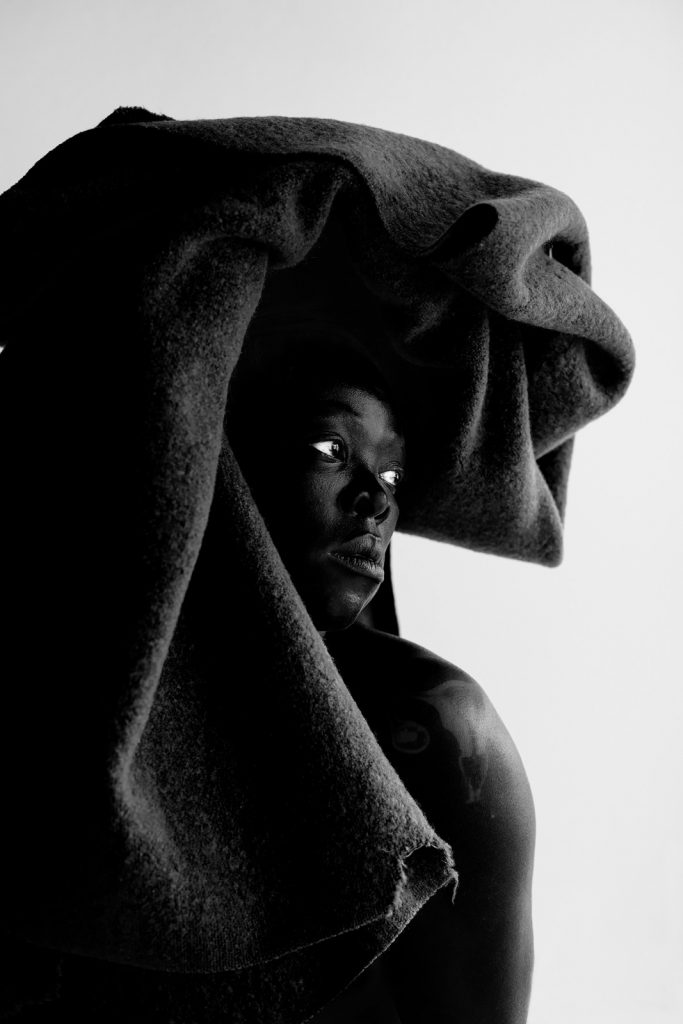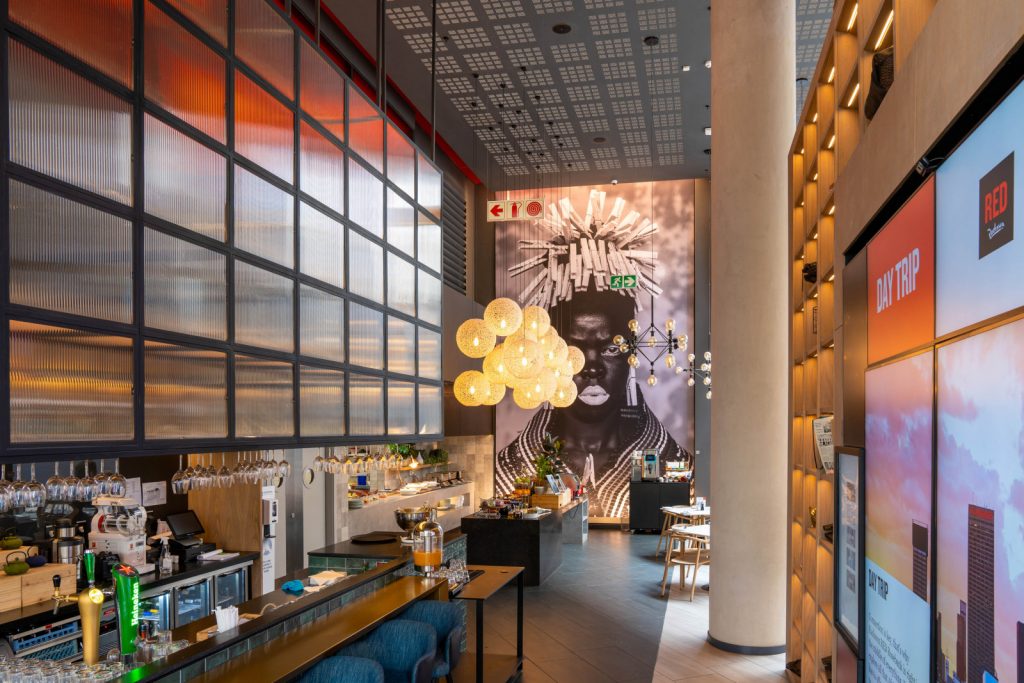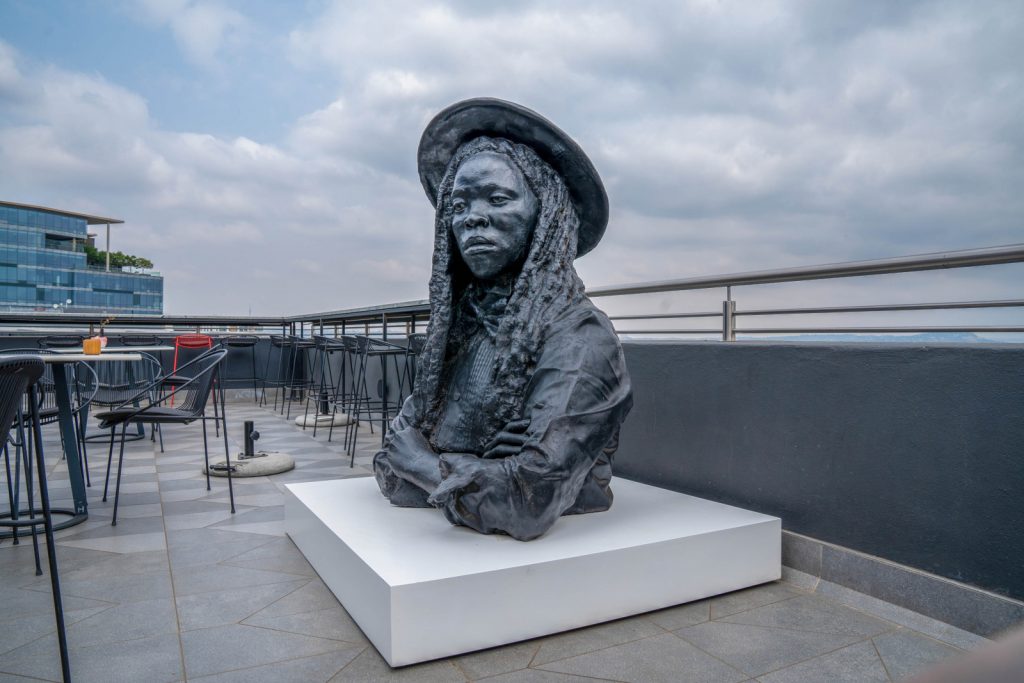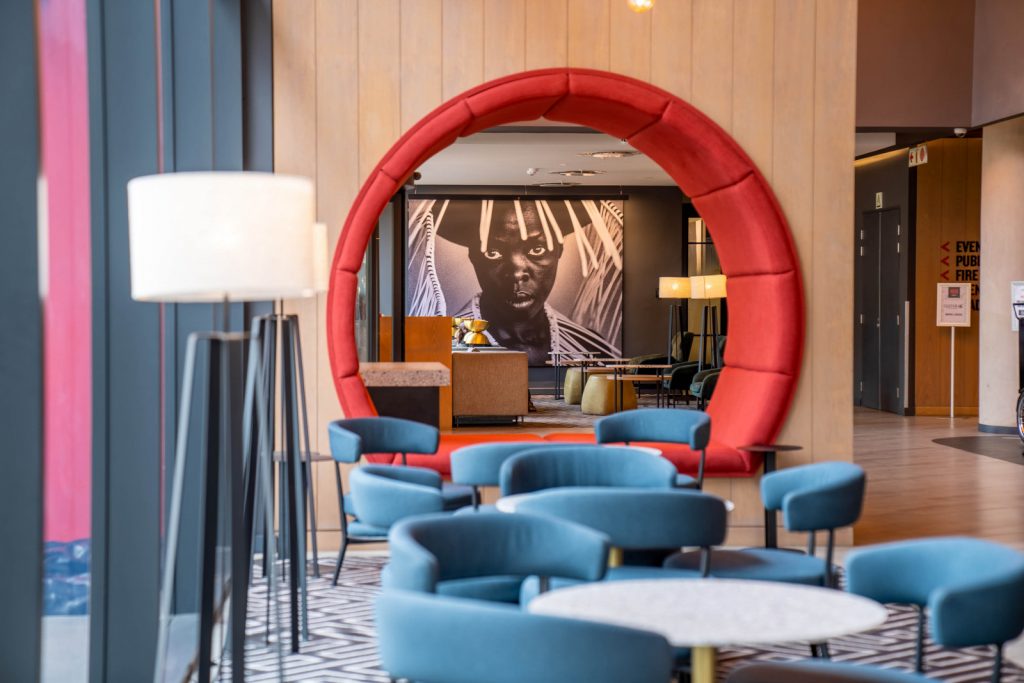I can’t say when I started to understand the work of Zanele Muholi as clearly as I do now. To be honest, I could not have been bothered to understand their work as a young exchange student from South Africa, having arrived only eight weeks before in Amsterdam, The Netherlands.
I had not been exposed to their work before then. I was 24 years old and pretty shielded from life. I had no idea of what it took to be a black lesbian in South Africa.
I was moved by the film Difficult Love at the Africa in the Picture Festival in Amsterdam at the time. It was the first of Muholi’s work I had experienced and it continues to haunt and captivate me even now, 11 years later.
To watch Difficult Love, which won the Africa in the Picture Award for best short film, is to deep dive into the unjust and violent reality of the LGBTIQ+ community, which was previously overlooked.
The film is seminal and symbolic, one of many works Muholi has poured themselves into for the betterment of humanity.
Not only is the film a visual diary of Muholi’s journey, it is also a documentation and a depiction of history and reality.
 Lelephi I, Highline Hotel, New York (2022) Photos: Courtesy of Zanele Muholi
Lelephi I, Highline Hotel, New York (2022) Photos: Courtesy of Zanele MuholiThe work has travelled across the globe and contributed to educating others on the impact of the brutality experienced in many of the under-represented communities of our country. Recently, Muholi has been investing in and creating change, one monumental step at a time.
In their creation of revolutionary initiatives, such as Faces and Phases, a body of work documenting the LGBTIQ+ community in a photographic series, Muholi found it necessary to engage their community through essential practices in visual culture — that of bearing witness to others and mirroring their stories through the medium.
The photographer and artist is someone who can be counted on to put the South African human rights story and the LGBTIQ+ community on the arts world map — unfazed by achievements or obstacles.
Their work has been recognised worldwide, consistently revealing a commitment and tenacity to see others being represented on their own terms — and with dignity, an inner motivation that is ingrained in them.
Increasingly, their influence has included a philanthropic voice and contribution to the visual arts and gender space. For this, Muholi has been honoured on many occasions around the world since 2005, including receiving the International Center of Photography’s Infinity Award for 2022 in New York.
Fast forward to 11 years later, we are no longer in Amsterdam, we are in Johannesburg. I find myself engaging with the body of work mounted on the walls of the Radisson Red Hotel in Rosebank. The labours of love and visionary works adorn sections of the hotel — the rooftop bar and the restaurant area, downstairs, come alive as people move in and out of the space.
The interaction between the restaurant patrons and the portraits is undefined, boundless in many ways, just as the legend.
Bester l, a photograph dedicated to Muholi’s late mother, who was a domestic worker most of their life, is juxtaposed with the kitchen area, where food is served by waitrons, a firm and telling testament of the activism Muholi speaks of in their work, of their political stance and firm belief in the importance of black visibility.
Notwithstanding the exhibition in Rosebank, Muholi is embarking on a new chapter. With a team of creative minds from different parts of South Africa, they are making inroads from Durban and Cape Town, working with local businesses to birth the Muholi Art Institute, also known as MAI. This is a unique space for critical and creative intellectual and cultural intervention — a community.
 Bonganini I, San Francisco (2022)
Bonganini I, San Francisco (2022)As usual, Muholi is accessible —another surprising, yet wonderful, part of understanding their practice — someone as real as they are is absolutely generous with their time. In addition to this essential part of their life, mainly because time has not stood still, it keeps moving and is filled with many beautiful experiences and people for them.
In December last year, without anyone watching over them or judging them, the Muholi Art Institute was formally established in Cape Town.
“We embrace leaders who are so in step with a call to engender pride in our identities and enable access to opportunities as an investment in the future; a future that can embrace the black and African child if we combine efforts and support initiatives such as MAI,” says the world-renowned visual artist.
Establishing MAI came with many challenges and it is in these challenges they’ve seen the importance of collaborating across disciplines. At the launch of MAI, the artist invited fellow creatives, such Nomonde Mbusi (actor), Napo Masheane (poet and director), Charmaine Carrol (photographer) and Indlovukazi Mapule (author), to speak to young artists and encourage them to tell their stories, irrespective of the circumstances in which they find themselves.
“Zanele Muholi is a very kind soul who I believe is god-sent, especially to young artists and emerging artists of this country. They know what they want. They are nurtures of artistic talent. They love art and education, they love people, there are always people around them, and they like people around them to have at least a qualification next to their names,” says Zanele Nsindane, a long-time collaborator of Muholi’s and a visual arts educator in a school in KwaZulu-Natal, where Muholi has been supporting many young learners in and around her hometown of Umbumbulu.
Through their establishment of the MAI, the artist and cultural producer have created a vital skills exchange and incubation space for artists, filmmakers, photographers, cultural researchers, activists and original thinkers in the creative community.
“Creating spaces for growth, opportunity, and mentorship is what we as a generational cohort should be invested in.”
“Without economic support, we won’t be doing justice to our own,” Muholi points out.
“The Muholi Art Institute is self-supporting and unique in its identity as an organisation and its ability to invest in the education and careers of young creatives while also building a strong sense of community to foster and support robust intellectual ideas in the arts, literature and academia. The organisation encourages self-reliance, expansive thinking and new ideas within a community of acceptance, a safe space where creative expression can thrive.
“The cultural programming and environment offer stimulating engagement and critical exchanges between local, pan-African and global artists working, studying and visiting,” explains Muholi.
Fellow cultural producer, art curator and filmmaker Beathur Mgoza Baker reflects on the criticality of addressing intersectional challenges faced by black and queer artists, thinkers and creatives.
“We cannot wait on the government to take the lead or enable opportunity across platforms in the cultural and creative sectors or expect our businesses and skills interventions to thrive if we are not active participants in enabling our own and the dreams of others.”
As colleagues in the visual arts world, Muholi has collaborated with Baker extensively on exhibitions and public intervention projects. Together, they have managed to fly the South African flag higher in many countries around the globe.
However, it is MAI that has brought their activism to full circle with global audiences.
 Be my guest: Zanele Muholi’s work graces the walls of the Radisson Red Hotel in Rosebank, Johannesburg.
Be my guest: Zanele Muholi’s work graces the walls of the Radisson Red Hotel in Rosebank, Johannesburg.
On a visit to the institute, at first glance, it is a blank canvas, with the wonderful Table Mountain peeking through the large windows. The light in the space is soothing — a space for any young creative mind to set their sights on a beautiful journey
“Art is beautiful,” Muholi shares with me. Often, when we speak of the empowerment of black people, it is people such as Professor Zanele Muholi who will engage young people first and check who is left behind.
“We could work together with other institutions without fear.”
Their purposeful, artistic and sociopolitical interventions and philanthropic work makes for a positive South African story at a time when the African continent is in its infancy in terms of the creative industries having autonomy and being recognised by its own leaders.
It is not only important to document our histories, it is also pivotal for us, as creative mavens led by the likes of Muholi, to be visible in order for others to be visible through us.
“Creating spaces for growth, opportunity and mentorship is what we as a generational cohort should be invested in through the work we do and our own creative praxis. Their commitment to creating and growing communities of artists, filmmakers, activists and cultural leaders is exemplary and admirable for generations that follow,” says Baker.
Moving through the MAI space, different artists occupy its studios, sweating and working hard to release their economic prowess to the world.
Muholi, who travels quite considerably, still manages to spend time with the many artists in residence. Moreover, they extend themselves to spend more time with artists in and around Cape Town.
One such artist is painter and creative entrepreneur Xolani Sivunda. Muholi has been mentoring him, sharing with him the lessons they have learned over the course of their career, spanning over 20 years.
“I met Professor Muholi last year and we became close. They invited me to be a guest artist at the Critic Masterclass at the Muholi Art Institute and, since then, Muholi has started to guide me about many things. Every time we have meetings, they end up being my listening sessions. They will do the talking, and I will take the teachings,” says Sivunda.
Back in 2011, when I witnessed Muholi win the Africa in the Picture Festival award in Amsterdam, presented by former festival director, Heidi Lobato, one could not have known how much the artist would accomplish and how unstoppable they would prove to be.
Our meeting was by sheer chance. Like many who know them, Muholi is direct, speaks with conviction and is passionate about education.
An alumnus of Ryerson University in Canada, they’ve managed to speak to their thesis from their master’s in documentary media through their work, such as Faces and Phases, as well as Somnyama Ngonyama — investing deeply in re-writing history with their brilliant Hail the Dark Lioness, a monograph that has been in circulation since 2018.

Muholi, the human being, loves art and people and, at 50, is increasingly becoming inspired by new artists and collecting art for their love of it.
What a life! On 29 November 2022, Muholi’s sculpture, Sleeping Figure was unveiled at Art Basel Miami. The sculpture is located in a grove of palm trees at Collins Canal Park, just outside the north doors of the Miami Beach Convention Center at the intersection of Washington Street and 21st Street in Miami. Let’s celebrate with them for being here. Present and visible.
I cannot say when I started to understand the work of Muholi as clearly as I do now. To be honest, I could not have been bothered to understand their work as a young exchange student in The Netherlands from South Africa, having arrived only eight weeks before in Amsterdam. I had not been exposed to their work before that moment. I was 24 years old and pretty shielded from life. I had no idea of what it took to be a black lesbian in South Africa.
I was completely moved by ‘Difficult Love’ back then at the African in the Picture Festival (AITP) in Amsterdam. It was the first Muholi body of work I experienced, and it continues to haunt and captivate me even now, 11 years later. To watch ‘Difficult Love’, a film that won them the African in The Picture Award for the Best short film, is to deep dive into the unjust and violent reality of the LGBTIQ+ community, which was previously overlooked.
The film is seminal and symbolic, one of many works Muholi has poured themselves into for the betterment of humanity. Not only is the film a visual diary of Muholi’s journey, it is also a documentation and a huge depiction of history and reality. The work travelled across the globe and contributed to educating others on the impact of the brutality experienced in many under-represented communities of our country. In recent times, Muholi has been investing in and creating change, one monumental step at a time.
In their creation of revolutionary initiatives such as ‘Faces and Phases’, a body of work documenting the LGBTIQ+ community in a photographic series Zanele Muholi saw it necessary to engage their community through essential practices in visual culture – that of bearing witness to others and mirroring their stories through the medium. The iconic photographer and artist is someone who can be counted on to (have) put the South African human rights story and the LGBTIQ+ community on the (Arts) world map – unfazed by the achievements or obstacles. Their work has been recognized worldwide, consistently revealing a commitment and tenacity to see others being represented on their own terms and with dignity, an inner motivation that is ingrained in them. Increasingly, their influence has steadily included a philanthropic voice and contribution to the visual arts and gender space. For this, Muholi has been honoured on many occasions around the world since 2005, including the most recent International Center of Photography’s Infinity (ICP) Award for 2022 in New York.
Fast forward to 11 years later, we are no longer in Amsterdam, we are in Johannesburg, I find myself engaged with the body of work mounted on the walls of the Radisson Red Hotel in Rosebank, Joburg. The labour of love and visionary works adorn sections of the hotel – the rooftop bar, upstairs and restaurant area, downstairs, come alive as people move in and out the space. The interaction between the restaurant patrons and the portraits is undefined – boundless in many ways just as the legend. Bester l, a photograph dedicated to Zanele Muholi’s late mother, who was a domestic worker for most of their life, is juxtaposed with the kitchen area, where food is served by waitrons. A firm and telling testament of the activism Muholi speaks of in their work. The political stance and firm belief in the importance of black visibility.
Notwithstanding the exhibition in Rosebank, Muholi is also embarking on a new chapter. With a team of creative minds from different parts of the SA, they are making new inroads from Durban and Cape Town managed to unite with surrounding businesses to birth the Muholi Art Institute, also known as MAI. This is a unique space for critical and creative intellectual and cultural intervention – a community.
As usual, Muholi is accessible – another surprising yet wonderful part of understanding their practice – someone as real as they are is absolutely generous with their time. In addition to this essential part of their life, mainly because time has not stood still, it keeps moving and is filled with many beautiful experiences and people for them. In December 2021, without anyone watching over them or judging them, the Muholi Art Institute was formally established in Cape Town. “We embrace leaders who are so in step with a call to engender pride in our identities and enables access to opportunities as an investment in the future; a future that can embrace the Black and African child if we combine efforts and support initiatives such as MAI,” says the world renowned visual artist. The premise of establishing the Muholi Art Institute comes with many challenges in the past and it is in these challenges they’ve seen the importance of collaborating across disciplines. At the launch of MAI, the artist invited fellow creatives such Nomonde Mbusi (actor), Napo Masheane (poet & director), Charmaine Carrol (photographer), Indlovukazi Mapule (author) to speak to young artists at MAI and encourage them to tell their stories, irrespective of the circumstances that they find themselves in.
“Zanele Muholi is a very kind soul whom I believe is Godsent, especially to young artists and emerging artists of this country. They know what they want. Muholi is a nurturer of artistic talent. They love art and education, they love people, there are always people around them, and they like people around them to have at least a qualification next to their names,” says visual arts educator, Zanele Nsindane.
A long-time collaborator of Muholi, Nsindane is a visual arts educator in a public school in KwaZulu-Natal, where Muholi has been supporting many young learners in and around her hometown of Umbumbulu. Through their establishment of the Muholi Art Institute, the artist and cultural producer have created a vital skills exchange and incubation space for artists, filmmakers, photographers, cultural researchers, activists and original thinkers in the creative community. “Without economic support, we won’t be doing justice to our own,” Muholi points out.
“The Muholi Art Institute (MAI) is self-supporting and unique in its identity as an organisation and its ability to invest in the education and careers of young creatives while also building a strong sense of community to foster and support robust intellectual ideas in the arts, literature and academia.The organisation encourages self-reliance, expansive thinking and new ideas within a community of acceptance, a safe space where creative expression can thrive. The cultural programming and environment offer stimulating engagement and critical exchanges between local, Pan-African and global artists working, studying and visiting,” explains Muholi.

Fellow cultural producer, art curator and filmmaker Beathur Mgoza Baker reflects on the criticality of addressing intersectional challenges faced by Black and queer artists, thinkers and creatives. “We cannot wait on the government to take the lead or enable opportunity across platforms in the cultural and creative sectors, or expect our businesses and skills interventions to thrive if we are not active participants in enabling our own and the dreams of others,” says Baker.
As colleagues in the Visual Arts fraternity, Muholi has collaborated with Baker extensively on exhibitions and public intervention projects. Together, they have managed to fly the South African flag higher in many countries around the globe. However, it is the Muholi Art Institute that has brought their activism to full circle with global audiences. On a visit to the Muholi Institute of Art, at first glance, it is a blank canvas, with the wonderful Table Mountain peeking through the large windows. The light in the space is soothing – a space for any young creative minds to set their sights on a beautiful journey. “Art is beautiful,” Muholi shares with me. Often, when we speak of the empowerment of black people, it is people such as Professor Zanele Muholi who will engage young people first and check who is left behind. “We could work together with other institutions without fear,” says Muholi.
Their purposeful, artistic and socio-political interventions and philanthropic work makes for a good South African positive story at a time when the African continent is in its infancy in terms of the creative industries having autonomy and being recognized by its own leaders. It is not only important to document our histories, but it is also even more pivotal for us, as creative mavens led by the likes of Professor Muholi, to be visible in order for others to be visible through us. “Creating spaces for growth, opportunity, and mentorship is what we as a generational cohort should be invested in through the work we do and our own creative praxis. Their commitment to creating and growing communities of artists, filmmakers, activists and cultural leaders is exemplary and admirable for generations that follow,” explains Baker.
Moving through the MAI space, different artists occupy its studios, grafting, sweating and working hard to release their economic prowess to the world. Muholi, who travels quite considerably, manages to spend time with the many artists in residence. Moreover, they extend themselves to spend more time with artists in and around Cape Town. One such artist is a painter and creative entrepreneur, Xolani Sivunda. Muholi has been mentoring him, sharing with him the lessons they have learned over the course of their career, spanning over 20 years. “I met Professor Muholi last year, and we became close. They invited me to be a guest artist at the Critic Masterclass at the Muholi Art Institute, and since then, Muholi has started to guide me about many things. Every time we have meetings, they end up being my listening sessions. They will do the talking, and I will take the teachings,” says Sivunda.
Back in 2011, when I witnessed Muholi win the AITP award in Amsterdam presented to Muholi by former festival Director, Heidi Lobato, one could not have known how much the artist would accomplish and be unstoppable. Our meeting was by sheer chance. Like many who know them, Muholi is direct, speaks with conviction and is passionate about education – an alumnus of Ryerson University as well, they’ve managed to speak to their thesis from their Masters in Documentary Media through their work such as ‘Faces and Phases’ as well as ‘Somnyama Ngonyama’ – investing deeply in re – writing history with their brilliant ”Hail the Dark Lioness”, a monograph that has been in circulation since 2018. Muholi, the human being loves art and people and at 50, they are increasingly becoming more inspired by new artists and collecting art for their love of it. What a life! Let’s celebrate with them for being here. Present and visible.
The Sleeping Figure, a sculpture by Zanele Muholi is currently on show at Art Basel Miami Meridians
[/membership]